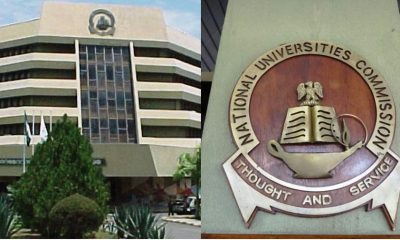Technology
How Businesses Can Prevent and Combat Cyber Threats

By Otori Emmanuel
Online business may have its benefits, but there is also a greater chance of hoaxes and cyber threats. The credibility of your business could be negatively affected by a successful cyber-attack. Therefore, safeguarding your business against cyber-attack is a crucial concern. That, if not prevented, may require a re-establishment of the business.
In extreme scenarios, it may even force you out of business permanently because you won’t be able to make up the lost revenue and customer loyalty, as clients want to feel safe in transactions. The good news is that you may take preventative action and safeguard your company before it’s too late by choosing from a selection of cyber insurance alternatives.
Preventive measures against cyber threats
- Installation of Devices and Network Security Software
Verify that your operating system and security applications are set to update automatically. Updates might include vital security upgrades for recent malware and threats. Most updates allow you to schedule them at a time that is more convenient for you, typically after office hours. It’s imperative to consistently follow update prompts since updates frequently fix serious security issues. Install security software to help prevent infection on business PCs and mobile devices. To prevent compromise on business laptops, desktops, and mobile devices, the software should have anti-virus, anti-spyware, and anti-spam filters. Setting up a firewall between your working devices and the internet acts as a gatekeeper for traffic entering and leaving. Maintain a robust firewall by regularly updating to the newest patches.
- Passphrase use and setting up several authenticators
If possible, take extra precautions to make your security more difficult to access because you do not want to lose your company to hackers. Instead of using passwords, use passphrases to secure your networks and devices that house sensitive company data. Passphrases are phrases or collections of words that are used as passwords. Humans find them easy to memorize, but computers find them challenging to decipher. A secure passphrase needs to be at least 14 characters long and includes a mix of capital and lowercase letters, digits, and special characters. For each of your accounts, use a different passphrase. If you are serious about protecting your company, changing passwords to passphrases is insufficient. To ensure that the legitimate owners are granting access, multi-factor authentication (MFA) is used in this situation. Before you can access your account, two or more forms of identification must be shown. Additional security for your accounts is provided by two-factor or multi-factor authentication.
- Protect sensitive information
The data that will be sent into and out of your company system needs to be encrypted after you’ve configured your authenticators. Before sending your data over the internet, encryption transforms it into a hidden code. Make sure your network encryption is enabled and that all data received or stored online is encrypted. This lowers the danger of theft, destruction, or tampering by limiting data access to parties that possess the encryption key. When utilizing a public network, you can enable network encryption by adjusting the settings on your router or by setting up a virtual private network (VPN) program on your computer.
- Backup your data
Data backup is one of the cheapest ways to guarantee that your information can be retrieved in the event of a cyber-incident or computer issue. Additionally, it is a less demanding technique to prevent future attacks. Although firewalls, antivirus software, and other security measures may malfunction, keeping a backup provides you with an advantage over attackers. To assist ensure the protection of your data, use a range of backup techniques, like routine incremental backups to a mobile device or cloud storage. Include weekly, quarterly, and yearly server backups as well. It should be regularly checked to see if this data is functioning properly and can be recovered. Store several copies of your backup offline, if possible.
- Your business’s safety is your employees’ safety
Your staff and device operators are responsible for your company’s security. Businesses should have clear cyber security policies that inform staff on what is appropriate while sharing data, using computers and other devices, and visiting websites. Your personnel should receive internet safety instructions making them aware of the dangers they can encounter and their responsibility for keeping your company safe. Hackers might have their access restricted by creating a culture of awareness. This is why it is so important to teach them how to recognize, avoid, and handle a cyber-attack and use strong passwords and passphrases.
Keep track of all the computing hardware and applications that your company employs. All the hardware and software that your company employs must be documented. Any software and hardware that are no longer in use should be disconnected from the network, and sensitive data should be deleted. Older, inactive hardware and software won’t likely be updated, and they could be exploited as a “backdoor” by thieves to attack companies. In a similar vein, you ought to deny access to former workers and people who have switched roles and no longer need it.
- Business continuity is based on customers’ safety
It’s crucial that you protect the information about your clients. Your company’s reputation will suffer if you misplace or compromise their information, and you risk legal repercussions. Make sure your company invests in a safe online transaction environment and protects any stored personal customer data. Find out what your payment gateway provider can do to stop online payment fraud if you accept payments online. Consider purchasing cyber insurance to safeguard your company. Dealing with a cyber-attack may cost far more than simply replacing computers, enhancing security, or repairing databases. Your company may benefit from the cost savings provided by cyber liability insurance coverage for attack recovery.
Technology
Telecom Operators to Issue 14-Day Notice Before SIM Disconnection

By Adedapo Adesanya
Telecommunications operators in Nigeria will now be required to give subscribers a minimum of 14 days’ notice before deactivating their SIM cards over inactivity or post-paid churn, following a fresh proposal by the Nigerian Communications Commission (NCC).
The proposal is contained in a consultation paper, signed by the Executive Vice Chairman and Chief Executive Officer of the NCC, Mr Aminu Maida, and titled Stakeholders Consultation Process for the Telecoms Identity Risks Management Platform, dated February 26, 2026, and published on the Commission’s website.
Under the proposed amendments to the Quality-of-Service (QoS) Business Rules, the Commission said operators must notify affected subscribers ahead of any planned churn.
“Prior to churning of a post-paid line, the Operator shall send a notification to the affected subscriber through an alternative line or an email on the pending churning of his line,” the document stated.
It added that “this notification shall be sent at least 14 days before the final date for the churn of the number.”
A similar provision was proposed for prepaid subscribers. According to the Commission, operators must equally notify prepaid customers via an alternative line or email at least 14 days before the final churn date.
Currently, under Section 2.3.1 of the QoS Business Rules, a subscriber’s line may be deactivated if it has not been used for six months for a revenue-generating event. If the inactivity persists for another six months, the subscriber risks losing the number entirely, except in cases of proven network-related faults.
The new proposal is part of a broader regulatory review tied to the rollout of the Telecoms Identity Risk Management System (TIRMS), a cross-sector platform designed to curb fraud linked to recycled, swapped and barred mobile numbers.
The NCC explained in the background section of the paper that TIRMS is a secure, regulatory-backed platform that helps prevent fraud stemming from churned, swapped, barred Mobile Station International Subscriber Directory Numbers in Nigeria.
It said this platform will provide a uniform approach for all sectors in relation to the integrity and utilisation of registered MSISDNs on the Nigerian Communications network.
In addition to the 14-day notice requirement, the Commission also proposed that operators must submit details of all churned numbers to TIRMS within seven days of completing the churn process, strengthening oversight and accountability in the system.
The consultation process, which the Commission said is in line with Section 58 of the Nigerian Communications Act 2003, will remain open for 21 days from the date of publication. Stakeholders are expected to submit their comments on or before March 20, 2026.
Technology
Silverbird Honours Interswitch’s Elegbe for Nigeria’s Digital Payments Revolution

By Modupe Gbadeyanka
The founder of Interswitch, Mr Mitchell Elegbe, has been honoured for pioneering Nigeria’s digital payments revolution.
At a ceremony in Lagos on Sunday, March 1, 2026, he was bestowed with the 2025 Silverbird Special Achievement Award for shaping Africa’s financial ecosystem.
The Silverbird Special Achievement Award recognises individuals whose innovation, vision, and sustained impact have left an indelible mark on society.
Mr Elegbe described the award as both humbling and symbolic of a broader journey, saying, “This honour represents far more than a personal milestone. It reflects the courage of a team that believed, long before it was fashionable, that Nigeria and Africa could build world-class financial infrastructure.”
“When we started Interswitch, we were driven by a simple but powerful idea that technology could democratise access, unlock opportunity, and enable commerce at scale.
“This recognition by Silverbird strengthens our resolve to continue building systems that empower businesses, support governments, and expand inclusion across the continent,” he said when he received the accolade at the Silverbird Man of the Year Awards ceremony attended by several other dignitaries, whose leadership and contributions continue to shape national development and industry transformation.
In 2002, Mr Elegbe established Interswitch after he was inspired by a bold conviction that technology could fundamentally redefine how value moves within and across economies.
Under his leadership, the company has evolved into one of Africa’s foremost integrated payments and digital commerce companies, powering financial transactions for governments, banks, businesses, and millions of consumers.
Today, much of Nigeria’s electronic payments ecosystem traces its foundational architecture to the systems and rails established under his leadership.
“Mitchell’s journey is inseparable from Nigeria’s digital payments evolution. His foresight and resilience helped establish foundational infrastructure at a time when the ecosystem was still nascent.
“This recognition affirms not only his personal legacy, but the broader impact of Interswitch in enabling commerce and strengthening financial systems across Africa,” the Executive Vice President and Group Marketing and Communications for Interswitch, Ms Cherry Eromosele, commented.
Technology
SERAP Seeks FCCPC Probe into Big Tech’s Impact on Nigeria’s Digital Economy

By Adedapo Adesanya
The Socio-Economic Rights and Accountability Project (SERAP) has called on the Federal Competition and Consumer Protection Commission (FCCPC) to urgently investigate major global technology companies over alleged abuses affecting Nigeria’s digital economy, media freedom, privacy rights and democratic integrity.
In a complaint addressed to the chief executive of FCCPC, Mr Tunji Bello, the group accused Google, Meta (Facebook), Apple, Microsoft (Bing), X, TikTok, Amazon and YouTube of deploying opaque algorithms and leveraging market dominance in ways that allegedly undermine Nigerian media organisations, businesses, and citizens’ rights.
The complaint, signed by SERAP Deputy Director, Mr Kolawole Oluwadare, urged the commission to take measures necessary to urgently prevent further unfair market practices, algorithmic influence, consumer harm and abuses of media freedom, freedom of expression, privacy, and access to information.”
SERAP also asked the FCCPC to convene a public hearing to investigate allegations of algorithmic discrimination, data exploitation, revenue diversion, and anti-competitive conduct involving the tech giants.
According to the organisation, dominant digital platforms now act as private gatekeepers of Nigeria’s information and business ecosystem, wielding enormous influence over public discourse and market competition without sufficient transparency or regulatory oversight.
“Millions of Nigerians rely on these platforms for news, information and business opportunities,” SERAP stated, warning that opaque algorithms and offshore revenue extraction models pose both economic and human rights concerns.
The group argued that the alleged practices threaten media plurality, consumer protection, privacy rights, and the integrity of Nigeria’s forthcoming elections.
SERAP pointed to actions taken by the South African Competition Commission, which investigated Google over alleged bias against local media content, adding that the South African probe reportedly resulted in measures including algorithmic transparency requirements, compliance monitoring and financial remedies.
SERAP urged the FCCPC to take similar steps to safeguard Nigerian media and businesses.
The organisation maintained that if established, the allegations could amount to violations of Sections 17 and 18 of the Federal Competition and Consumer Protection Act (FCCPA), which prohibit abuse of market dominance and anti-competitive conduct.
SERAP stressed that the FCCPC has statutory authority to investigate and sanction conduct that substantially prevents, restricts or distorts competition in Nigeria.
It also warned that failure by the Commission to act promptly could prompt the organisation to pursue legal action to compel regulatory intervention.
Citing concerns reportedly raised by the Nigerian Press Organisation (NPO), SERAP said big tech companies have fundamentally altered Nigeria’s information environment, creating what it described as a structural imbalance of power that threatens the sustainability of professional journalism.
Among the allegations listed are: Algorithms controlled outside Nigeria determining content visibility, monetisation of Nigerian news content without proportionate reinvestment, offshore extraction of advertising revenues, limited discoverability of Nigerian websites and platforms, and lack of transparency in ranking and recommendation systems.
SERAP argued that declining revenues in the Nigerian media industry have led to shrinking newsrooms, closure of bureaus, and the emergence of news deserts, weakening journalism’s constitutional role in democratic accountability.
The organisation further warned that algorithmic opacity and data-driven micro-targeting could influence voter exposure to information ahead of Nigeria’s forthcoming elections, raising concerns about electoral fairness and transparency.
-

 Feature/OPED6 years ago
Feature/OPED6 years agoDavos was Different this year
-
Travel/Tourism10 years ago
Lagos Seals Western Lodge Hotel In Ikorodu
-

 Showbiz3 years ago
Showbiz3 years agoEstranged Lover Releases Videos of Empress Njamah Bathing
-

 Banking8 years ago
Banking8 years agoSort Codes of GTBank Branches in Nigeria
-

 Economy3 years ago
Economy3 years agoSubsidy Removal: CNG at N130 Per Litre Cheaper Than Petrol—IPMAN
-

 Banking3 years ago
Banking3 years agoSort Codes of UBA Branches in Nigeria
-

 Banking3 years ago
Banking3 years agoFirst Bank Announces Planned Downtime
-

 Sports3 years ago
Sports3 years agoHighest Paid Nigerian Footballer – How Much Do Nigerian Footballers Earn




















